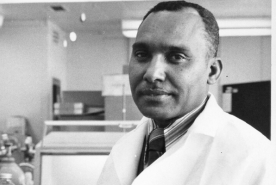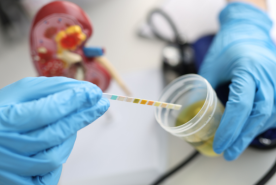Types
A biopsy sample can be done in one of two ways:
- Percutaneous (through the skin) biopsy: a needle is placed through the skin that lies over the kidney and guided to the right place in the kidney, usually with the help of ultrasound
- Open biopsy: the kidney sample is taken directly from the kidney during surgery. The kidney sample is then sent to a pathology lab to check for any signs of disease.
Purpose
Some kidney problems can be found with blood and urine (pee) tests, a sonogram (an image made by ultrasound) or other special x-rays, and a physical exam rather than a biopsy. But in some patients with certain types of kidney disease, and those with a kidney transplant that is not working well, a correct diagnosis can only be made with a kidney biopsy.
Some reasons why your doctor may want to do a kidney biopsy include:
- Blood (hematuria) or protein (proteinuria) in the urine
- Abnormal blood test results
- Acute or chronic kidney disease (CKD) with no clear cause
- Nephrotic syndrome and glomerular disease (which happens when the filtering units of the kidney are damaged)
- See if kidneys are responding well to treatment
- Check if kidneys are permanently damaged
- Learn why a transplanted kidney is not working well
- See if a kidney tumor is cancerous
- Check for other unusual or special conditions
- See if any medications are hurting your kidneys
Risks
The risks from a kidney biopsy are very small, but they should be discussed with your healthcare professional. As in other medical and surgical procedures, certain complications may happen even though every effort is taken to prevent them.
A blood transfusion may be needed if serious bleeding occurs. Rarely, surgery may be needed to fix a blood vessel that is damaged during the procedure. Infections are not common, but should one occur, they can be treated with antibiotics.
Before the procedure
For most kidney biopsies, patients are advised to not take over-the-counter pain medicines such as aspirin, ibuprofen (Advil®, Motrin®), naproxen (Aleve®), or other medicines that may cause thinning of the blood for 2 weeks prior to the test. These medicines can change the way the blood clots and raise the risk of bleeding. For the same reason, you will likely be instructed to stop taking certain supplements such as fish oil.
Blood and urine samples are usually taken before the kidney biopsy to make sure you do not have an infection or other condition. Your doctor may also want you to change other medications before the biopsy. You may be told you should not eat or drink for eight hours before the procedure.
During the procedure
A kidney biopsy is usually done in a hospital. An overnight stay may be needed to watch for any problems that may occur after the procedure is completed. You may be awake with only light sedation or asleep under general anesthesia. You will be lying face down with a pillow under your rib cage. If the biopsy is done on a transplanted kidney, you will be lying on your back.
Percutaneous (needle) biopsy: the kidney is found using a sonogram, x-ray images, or both. Sometimes, an injection of dye into your veins may be needed to help the doctor find your kidney and important blood vessels. Once the biopsy site is found, your skin is marked and cleaned where the biopsy needle will be inserted.
You will receive a local anesthetic to numb the area where the biopsy needle enters. You will be asked to take a deep breath and hold it as the doctor puts in the needle. When the needle pushes through the skin to the kidney, you may feel a "pop" or pressure. It is important to stay still and to hold your breath (about 45 seconds or less).
Sometimes two needles are needed to get enough of the kidney sample for diagnosis. When enough of the sample is taken, the needle(s) are taken out and a bandage is placed over the needle puncture site. The entire procedure, from start to finish, usually lasts about one hour.
Open kidney biopsy: some patients should not have a percutaneous biopsy because they may have a history of bleeding problems. For these patients, an open operation may be done where the surgeon can actually see the kidney to get a good sample to test.
After the procedure
You may need to rest in bed for 12 to 24 hours after the biopsy, as directed by your doctor. Staying still in bed helps to heal the place where the kidney sample was taken and to lower the chance of bleeding.
Your blood pressure and pulse are checked often to look for any signs of bleeding inside your body, or other problems. Blood tests are also done. You may eat and drink fluids after the biopsy. If your blood tests, blood pressure, and pulse are stable, you should be allowed to leave the hospital the next day.
Your doctor will talk to you about physical activity and things to watch for after going home from the hospital. Heavy lifting, strenuous exercise, including contact sports, and sexual intercourse should be avoided for two weeks after the biopsy.
If you had an open biopsy procedure, be sure to ask your doctor for any specific instructions you need to follow after the surgery.
Results
After the kidney sample is taken, it is sent to specially trained doctors, called pathologists, who will look at your sample and write a report on the findings. It often takes three to five days to get the full biopsy results. In some cases, you may have a partial or full report within 24 hours or less.
This content is provided for informational use only and is not intended as medical advice or as a substitute for the medical advice of a healthcare professional.








